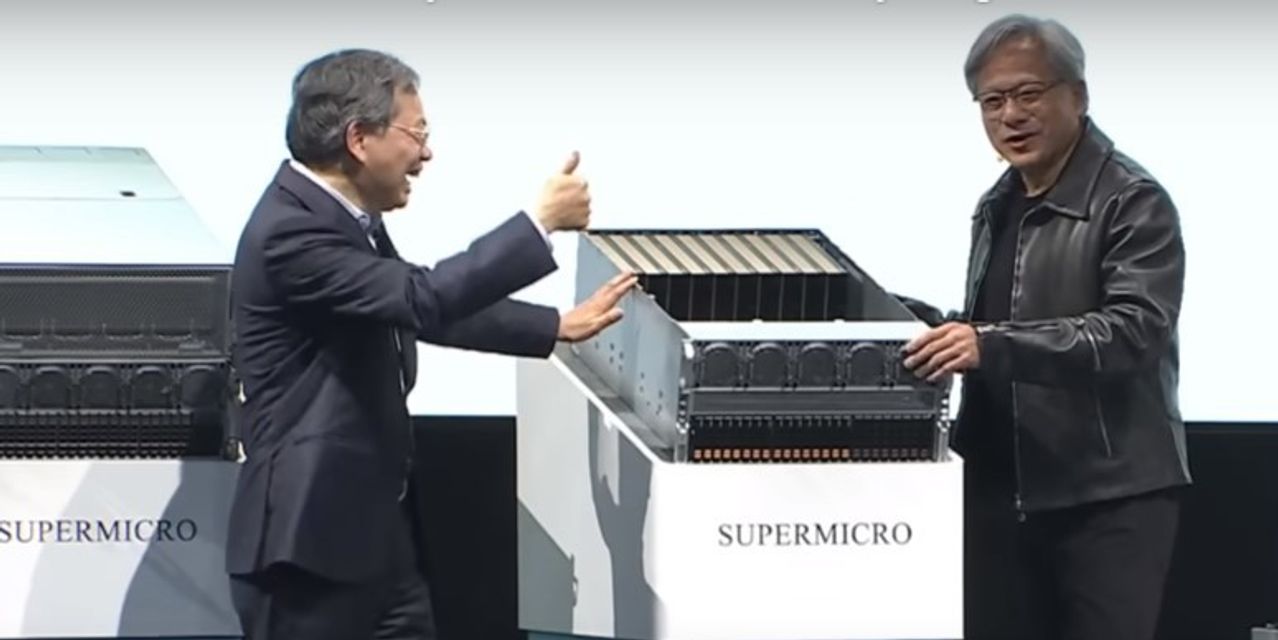Super Micro Computer Inc., a longtime Nvidia Corp. partner and server maker, is now seeing over half of its revenue coming from AI-related server sales, and that’s a potential risk investors should consider.
On Wednesday, Supermicro
SMCI,
reported fiscal first-quarter revenue of $2.12 billion, amid tight supply constraints, just below the high end of its previous guidance. It also raised its annual guidance by $500 million, to between $10 billion and $11 billion, from its previous range of $9.5 billion to $10.5 billion. Its shares jumped 3.7% in after-hours trading, and have rocketed more than 200% so far this year, fueled by investor frenzy over its role in selling AI-ready servers.
Supermicro, which has worked closely with Nvidia
NVDA,
to offer servers running its hotly sought-after GPUs for AI, also said it is working closely with both Intel Corp.
INTC,
and Advanced Micro Devices Inc.
AMD,
to offer their AI-focused graphics processors, such as Intel’s Gaudi and AMD’s MI300 families.
“We fully expect many of these products to gain broad adoption and expand our share in the accelerated-compute market,” Supermicro Chief Executive Charles Liang told analysts in a conference call Wednesday.
In its first quarter, Supermicro said more than 50% of its revenue came from AI-related servers, and that one large data-center customer represented over 25% of its revenue. That was a big jump from February, when Supermicro said over 20% of its revenue came from AI platforms for the full year of 2022. In its fourth quarter, it said AI was nearly half its revenue.
Read also: AI has given a big boost to Supermicro’s stock.
That surge in its business coming from AI is a positive, but could also be an eventual negative, if demand ever starts to slow down after a huge ramp-up in enterprise spending on AI.
Matt Bryson, a Wedbush Securities analyst, brought up this topic in August, after Supermicro’s fourth-quarter earnings. He rated Supermicro as a market underperform, as it was trading over 20 times its fiscal 2025 estimates at the time. He also cited other concerns, such as “our uncertainty around the sustainability of some of the dynamics that are benefiting SMCI today (e.g., the longevity of the steep increase in emerging AI cloud demand),” and the potential for margins to compress, as component availability improves.
Supermicro offers many additional services for its customers, including customization of servers and liquid cooling solutions, which previously have mostly been associated with supercomputers. Liang said he expects 20% of its data-center customers will move to liquid cooling, especially with an increase in power consumption and thermal challenges due to the enormous power needs of AI applications.
But as the company’s revenue becomes more dependent on the AI boom, it is potentially a setup for disappointment for investors, if and when that boom gradually slows down, or, dare we say, suddenly crashes.
This is not just a question for Supermicro, but it also can be asked about a slew of companies currently benefiting from the big AI-spending ramp, especially Nvidia. In Nvidia’s case, in addition to its now-massive data-center business, it generates some other revenue from gaming, and to an even lesser extent automotive and visualization. Supermicro also sells standard servers to the IT industry that are not AI-ready.
Even so, as both Supermicro and Nvidia derive more and more revenue from the AI boom, it is a potential double-edged sword for investors.
Read the full article here










